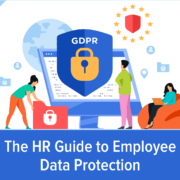HR GDPR Training: How to Strengthen Employee Data Protection and Compliance in 2025
In today’s digital workplace, human resources (HR) professionals handle massive amounts of employee and applicant data. With the General Data Protection Regulation (GDPR) governing how organizations within the European Union (EU) manage personal data, HR compliance has become a top priority. Failure to comply with GDPR can result in severe fines, reputational harm, and loss of employee trust.
HR GDPR training ensures that HR professionals understand how to lawfully collect, store, and process sensitive employee data while maintaining transparency and accountability across all operations.
Understanding GDPR and Its Relevance to HR
The General Data Protection Regulation (GDPR) is a cornerstone of EU data protection law, introduced to safeguard individuals’ personal information. For HR teams, GDPR applies to every step of the employment process — from recruitment and onboarding to payroll and offboarding.
HR departments often act as data controllers or processors, handling personal identifiable information (PII) such as addresses, financial details, health records, and disciplinary data. GDPR requires that this information be processed lawfully, fairly, and transparently. HR professionals must also respect employees’ rights to access, rectify, or delete their personal information.
The European Data Protection Board (EDPB) oversees the consistent application of GDPR across EU member states, guiding HR departments toward best practices.
Why HR GDPR Training is Essential
Without proper training, HR staff can unintentionally violate GDPR by mishandling data or overlooking consent requirements. The Information Commissioner’s Office (ICO) in the UK has reported several cases where HR teams failed to securely manage employee data, leading to costly penalties.
HR GDPR training reduces these risks by improving awareness of compliance procedures. It helps HR professionals understand data protection obligations, build robust policies, and respond effectively to data breaches. Training also promotes trust between employers and employees, showing that the company values privacy and security.
Key Topics Covered in HR GDPR Training
A comprehensive HR GDPR training program covers several essential areas, including:
- Core GDPR Principles: Understanding lawfulness, fairness, purpose limitation, and data minimization.
- Data Subject Rights: Recognizing employee rights to access, rectification, erasure, and portability.
- Consent Management: Learning how to obtain and record valid employee consent.
- Data Retention Policies: Setting clear rules for how long HR data is stored and when it must be deleted.
- Incident Response: Knowing how to report and handle data breaches in coordination with the Data Protection Officer (DPO).
- Third-Party Processors: Ensuring HR software vendors comply with GDPR requirements.
- Record Keeping: Maintaining detailed audit trails and documentation for compliance verification.
Training modules can be customized to align with company policies and national data protection laws.
Implementing GDPR Training in HR
Rolling out HR GDPR training should be an ongoing, organization-wide initiative. Companies can use in-person workshops, online learning platforms, or Learning Management Systems (LMS) to deliver training.
It is essential to appoint a Data Protection Officer (DPO) or compliance manager responsible for monitoring HR practices and updating staff on regulatory changes. Regular refresher sessions help HR teams stay informed about new guidance issued by bodies like the EDPB or ICO.
By embedding GDPR principles into HR workflows, organizations create a culture where privacy is prioritized in every employee interaction.
Best Practices for Maintaining GDPR Compliance in HR
- Conduct annual data audits to identify risks.
- Ensure third-party vendors (like HR software providers) have GDPR-compliant contracts.
- Keep privacy notices transparent and easy to understand.
- Encourage HR employees to report any data issues immediately.
- Document all compliance efforts to demonstrate accountability during audits.
These practices not only protect employee information but also strengthen the company’s reputation for ethical data management.
Where to Get Certified HR GDPR Training
HR professionals can access accredited GDPR training programs through:
- The Information Commissioner’s Office (ICO) – Offers UK-based GDPR resources and e-learning tools.
- The European Data Protection Board (EDPB) – Provides official guidelines and recommendations.
- The EU GDPR Portal – A central resource for GDPR updates.
- Professional learning platforms like LinkedIn Learning and Coursera which offer HR-focused GDPR courses.
- CompliQuest: GDPR Guide for HR Professionals
This is a focused course designed specifically for HR practitioners. It offers practical guidelines and exercises for managing employee personal data compliantly throughout the employment lifecycle.- Course Duration & Format: Approximately 30 minutes, self-paced format.
- Who Should Take It: HR specialists, legal teams, managers, and Data Protection Officers (DPOs) who interact with HR data
- Modules Covered:
- Recruitment process — lawful collection of candidate data
- Data processing during employment — handling email monitoring, biometric data, GPS tracking, etc.
- Post-termination processing — managing residual personal data after employment ends
- Recruitment process — lawful collection of candidate data
- Course Duration & Format: Approximately 30 minutes, self-paced format.
- This course issues a certificate and includes templates, contract examples, and practical case studies. compliquest.co
Because the CompliQuest offering is HR-specific, it can complement broader GDPR courses by delivering role-relevant insight and real-world examples.
FAQs
1. What is HR GDPR training?
HR GDPR training educates HR professionals on how to handle employee and applicant data in compliance with EU data protection laws.
2. Who should take GDPR training in HR?
All HR staff, recruiters, payroll specialists, and managers handling employee data should complete GDPR training.
3. How often should HR departments refresh GDPR training?
Experts recommend refresher courses every 12–18 months, especially when regulatory updates occur.
4. What happens if HR fails to comply with GDPR?
Organizations risk hefty fines (up to 20 million euros or 4% of global turnover), reputational damage, and loss of employee confidence.
Conclusion
GDPR compliance is not just a legal requirement—it is a foundation for trust in every workplace. Investing in HR GDPR training ensures that HR professionals understand their data protection responsibilities and can uphold the privacy rights of employees.
By embedding GDPR awareness into daily HR operations, organizations build stronger, more transparent, and compliant workplaces ready for the challenges of 2025.

